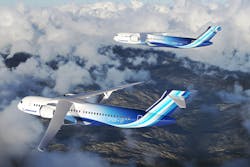Strutted airliner might replace 737
ARLINGTON, Va., - Boeing says its collaboration with NASA on a highly efficient single-aisle airliner could lead to a replacement for the 737. In an earnings call on Wednesday, Boeing CEO Dave Calhoun confirmed that the Sustainable Flight Demonstrator meets the “standard needed to launch a commercial airplane” with its major increases in fuel efficiency. “The program that we’ve embarked on here is how do you commercialize it?” Calhoun told the call. “So, there’s real intent there to be able to do it.” Russ Niles for AVWeb reports. Continue reading original article.
The Military & Aerospace Electronics take:
31 January 2023 - When combined with expected advancements in propulsion systems, materials and systems architecture, a single-aisle airplane with a TTBW configuration could reduce fuel consumption and emissions up to 30% relative to today's most efficient single-aisle airplanes, depending on the mission. The SFD program aims to advance the civil aviation industry's commitment to reaching net zero carbon emissions by 2050, as well as the goals set forth in the White House's U.S. Aviation Climate Action Plan.
Ultrathin wings braced by struts with larger spans and higher-aspect ratios could eventually accommodate advanced propulsion systems that are limited by a lack of underwing space in today's low-wing airplane configurations. For the demonstrator vehicle, Boeing will use elements from existing vehicles and integrate them with all-new components.
NASA's funding through the SFD Space Act Agreement totals $425 million. The SFD program will also leverage up to $725 million in funding by Boeing and its industry partners to shape the demonstrator program and meet the resource needs required. Separately, Boeing's previous internal investments for recent phases of sustainable aviation research total $110 million.
Related: Virgin to fly 'net-zero' transatlantic Boeing 787
Related: Final 747 'Queen of the Skies' leaves Boeing's factory
Related: Boeing's solar cells to power Earth surface survey satellite
Jamie Whitney, Associate Editor
Military + Aerospace Electronics
